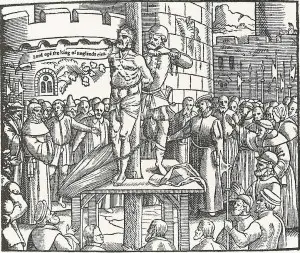
On 6th October 1536, or somewhere around that date, English reformer, scholar and Bible translator, William Tyndale, “was tied to the stake, and then strangled first by the hangman, and afterwards consumed with fire in the town of Filford [Vilvoorde]”, around eighteen miles from Antwerp. The strangling was botched and Tyndale was alive when he was tied to the stake and burned. According to martyrologist John Foxe, as he burned Tyndale cried out “Lord, open the King of England’s eyes.”
Although Tydale’s book, “The Obedience of a Christian Man”, had helped Henry VIII defy papal authority and break with Rome, his opposition to the annulment of Henry’s marriage to Catherine of Aragon had infuriated the King. In his TV programme on Tyndale, “The Most Dangerous Man in Tudor England”, Melvyn Bragg explained how heretic hunting began in Antwerp in 1535 because it was under the control of Emperor Charles V. Tyndale befriended a new arrival, Harry Phillips, who claimed to be an Oxford graduate interested in Reform. However, Phillips was actually colluding with the Imperial Court and he betrayed Tyndale. On 21st May 1535, Phillips visited the English House in Antwerp, where Tyndale was living, and said he had no money, Tyndale offered to take him out for a meal and as they walked down an alley two guard arrested Tyndale. Phillips had acted as Judas. Tyndale was imprisoned in the Castle of Vilvoorde for 14 months. Thomas Cromwell tried to secure Tyndale’s release but Henry VIII had no sympathy for Tyndale and would not intervene. Bragg went on to say that by the time of his death, Tyndale had translated the New Testament and the first five books of the Old Testament.
You can read the notes I took watching “The Most Dangerous Man in Tudor England” by clicking here and you can read more about Tyndale’s link to Anne Boleyn in my recent article Anne Boleyn, William Tyndale and Henry VIII.

IIRC, Tyndale agreed with the Pope (and with Martin Luther) that Henry’s marriage to Catherine of Aragon was valid; I don’t think that these three agreed on much else — but Henry would never forgive anyone who refused to confuse Henry’s will with G-d’s will..
Very true — Tyndale appears to have been constitutionally incapable of flattering anyone. You’d think that if three such disparate figures agreed on one thing, that would make most people take a step back and reconsider, but not our Henry, that’s for sure :).